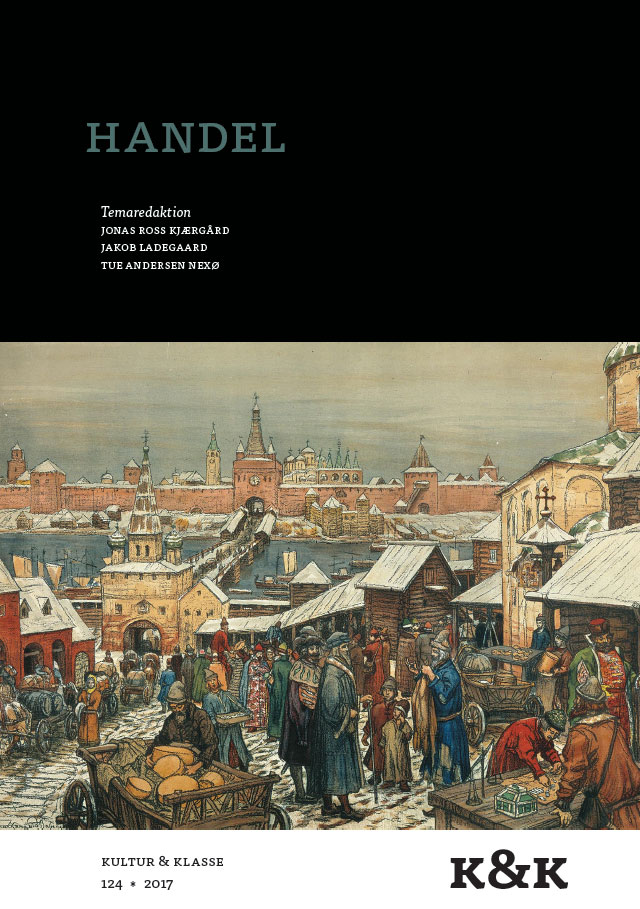”the regular way of trade”: Between trade and speculation in Trollope’s The Way We Live Now, 1875 and Émile Zola’s L’Argent, 1891
DOI:
https://doi.org/10.7146/kok.v45i124.25956Nøgleord:
trade, financial speculation, financial crime, literary form, novel, money, finance, capitalismResumé
This article applies a historical formalist method to analyze two literary responses to the late nineteenth-century financial sector in England and France: Anthony Trollope’s The Way We Live Now, 1875 and Émile Zola’s L’Argent, 1891. The central issue in both novels is the legal and conceptual boundary between traditional commerce and financial speculation, and the variety of ways in which established social forms and hierarchies are challenged by a rapid introduction of new forms of financial activity such as joint-stock corporations and limited liability. Both novels concern themselves with the contradictions inherent in the concept of trade and commerce in this transformed financial context, and devote critical attention to the ways in which these new forms collide in the individual lives and ambitions of its characters. Drawing on a recent theory of form by Caroline Levine, the article demonstrates how these literary representations of the accelerating financial sector should not simply be seen as reflections of an economic context in turmoil. Rather, the article argues that they apply the affordances of economic and financial forms in what is essentially an interpretative gesture, directed at the only partially visible and constantly changing reality of financial capitalism.
Referencer
Andersen, Michael Høxbro: "Spekulationsfeber. Finansielle fiktioner i Émile Zolas 'penge'". PASSAGE - Tidsskrift for Litteratur og kritik, 71, 2014. 97-109
Evans, David Morier: Facts, failures, and frauds: Revelations, financial, mercantile, criminal. London: Groombridge & sons, 1859.
Houston, Gail Turley: From Dickens to Dracula: Gothic, Economics, and Victorian Fiction. Cambridge, Cambridge University Press, 2007.
Hunt, Aeron: Personal Business: Character and Commerce in Victorian Literature and Culture, Charlottesville & London, 2005
Johnson, Paul: Making the Market: Victorian Origins of Corporate Capitalism. Cambridge, Cambridge University Press, 2010
Kjærgård, Jonas Ross: “Litteratur og økonomi: Kulturhistorie, boghistorie og øko-nomiske stemninger i Meïr Aron Goldschmidts ’Maser’ (1868), upubliceret manuskript, under peer-review
Lamb, John. B.: “The Paper Age: Currency, Crisis, and Carlyle” Prose Studies, 30:1, 2008. 27-44. DOI: 10.1080/01440350801939500
Levine, Caroline: Forms, Princeton University Press, 2015
Lobban, Michael: “Corporate Identity and Limited Liability in France and England 1825-67”, Anglo-American Law Review, 25(4), 397-440, 1996
Oliphant, Laurence: “The autobiography of a joint-stock company (limited)” [1876] In: Mary Poovey (Ed.), The Financial System in Nineteenth-Century Britain (pp. 327-356) Oxford University Press, 2003
Poovey, Mary (Ed.): The Financial System in Nineteenth-Century Britain. New York & Oxford, Oxford University Press, 2003
Robb, George: White-Collar Crime in Modern England: Financial Fraud and Business Morality, 1845-1929, Cambridge University Press, 1992
Taylor, James: Boardroom Scandal: The Criminalization of Company Fraud in Nineteenth-Century Britain, Oxford University Press, 2013
Trollope, Anthony: The Way We Live Now, ed. Francis O’Gorman, Oxford University Press, 2016
Weiss, Barbara. The Hell of the English: Bankruptcy and the Victorian Novel. Lewisburg, Bucknell University Press, 1986
Zola, Émile: Penge. København: A. Christiansens Forlag, 1903
Zola, Émile: L'argent. Paris: Garnier-Flammarion, 1974
Andre referencer
Scorsese, Martin (dir.): The Wolf of Wall Street, Paramount Pictures, 2013
Publiceret
Citation/Eksport
Nummer
Sektion
Licens
Tidsskriftet følger dansk ophavsret.





